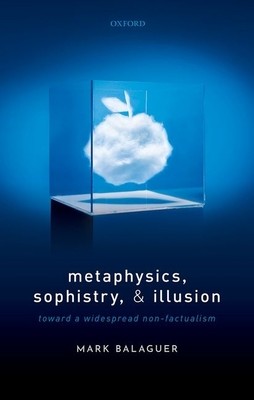
- We will send in 10–14 business days.
- Author: Mark Balaguer
- Publisher: Oxford University Press, USA
- ISBN-10: 0198868367
- ISBN-13: 9780198868361
- Format: 16.3 x 23.6 x 2.8 cm, hardcover
- Language: English
- SAVE -10% with code: EXTRA
Reviews
Description
Metaphysics, Sophistry, and Illusion does two things. First, it introduces a novel kind of non-factualist view, and argues that we should endorse views of this kind in connection with a wide class of metaphysical questions, most notably, the abstract-object question and the composite-object question. (More specifically, Mark Balaguer argues that there's no fact of the matter whether there are any such things as abstract objects or composite objects--or material objects of any other kind.) Second, Metaphysics, Sophistry, and Illusion explains how these non-factualist views fit into a general anti-metaphysical view called neo-positivism, and explains how we could argue that neo-positivism is true. Neo-positivism is the view that every metaphysical question decomposes into some subquestions--call them Q1, Q2, Q3, etc.--such that, for each of these subquestions, one of the following three anti-metaphysical views is true of it: non-factualism, or scientism, or metaphysically innocentmodal-truth-ism. These three views can be defined (very roughly) as follows: non-factualism about a question Q is the view that there's no fact of the matter about the answer to Q. Scientism about Q is the view that Q is an ordinary empirical-scientific question about some contingent aspect of physical reality, and Q can't be settled with an a priori philosophical argument. And metaphysically innocent modal-truth-ism about Q is the view that Q asks about the truth value of a modal sentence that's metaphysically innocent in the sense that it doesn't say anything about reality and, if it's true, isn't made true by reality
EXTRA 10 % discount with code: EXTRA
The promotion ends in 17d.16:16:55
The discount code is valid when purchasing from 10 €. Discounts do not stack.
- Author: Mark Balaguer
- Publisher: Oxford University Press, USA
- ISBN-10: 0198868367
- ISBN-13: 9780198868361
- Format: 16.3 x 23.6 x 2.8 cm, hardcover
- Language: English English
modal-truth-ism. These three views can be defined (very roughly) as follows: non-factualism about a question Q is the view that there's no fact of the matter about the answer to Q. Scientism about Q is the view that Q is an ordinary empirical-scientific question about some contingent aspect of physical reality, and Q can't be settled with an a priori philosophical argument. And metaphysically innocent modal-truth-ism about Q is the view that Q asks about the truth value of a modal sentence that's metaphysically innocent in the sense that it doesn't say anything about reality and, if it's true, isn't made true by reality


Reviews